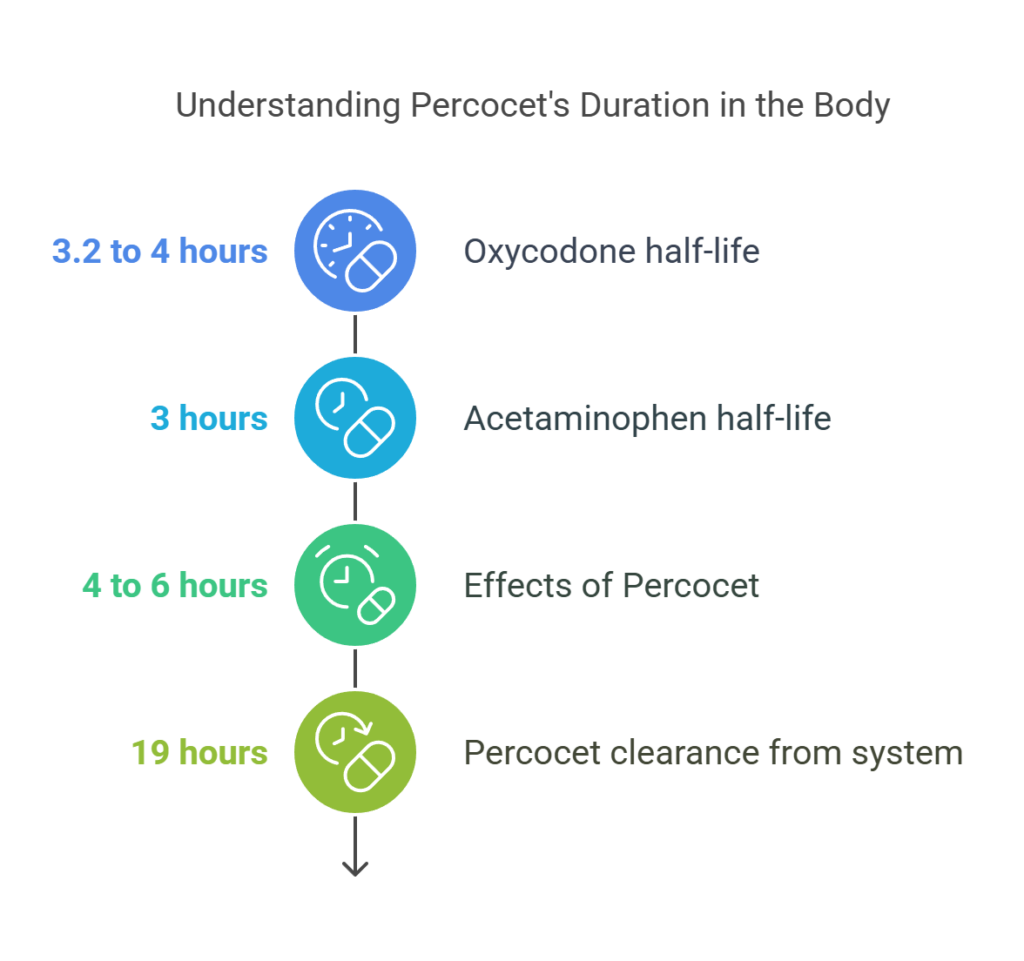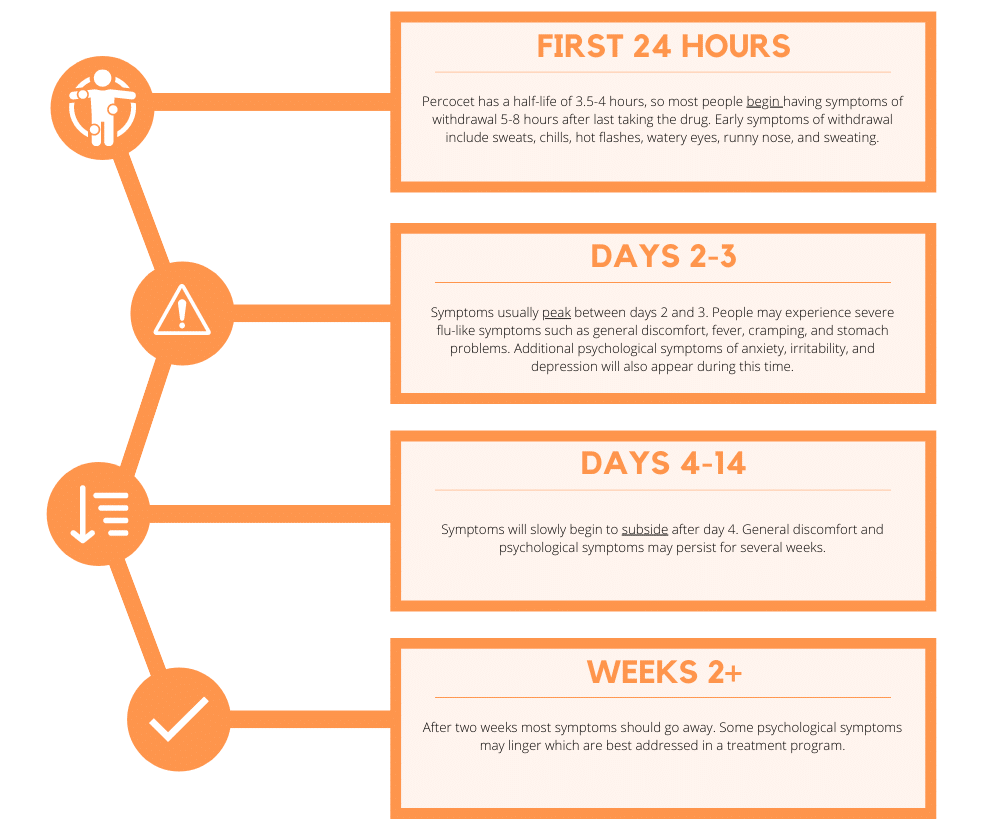How long does Percocet stay in your system is a vital question for patients to whom the doctors prescribe this drug. Percocet is a prescription drug that comprises the opioids oxycodone and acetaminophen.
This drug treats symptoms of fever and chronic pains. However, Percocet is highly addictive. Due to its addictive nature, doctors favor this drug only for a short period. As per statistics, over 3.3 million individuals are developing and becoming dependent on Percocet every year.
After using Percocet, individuals might experience similar effects to that of the narcotic heroin. The chemical composition of Percocet causes these euphoric and hallucinatory effects. As a result, many individuals might feel the temptation to use Percocet for its euphoric effects. However, the danger of using Percocet is that an individual can become dependent or addicted to this drug.
Additionally, when an individual ceases the use of Percocet, they might experience nasty withdrawal symptoms. Therefore, to stay safe from the side effects of Percocet, avoid developing a dependency and addiction, and safely withdraw from this drug, it is crucial to understand how long Percocet stay in your system.
A Percocet drug test can determine the presence of Percocet and how long Percocet stays in your system. Since Percocet is highly addictive, many drug tests screen for its presence in the system.
Addiction treatment centers and some employers mandate this drug test. Standard drug tests can detect traces of Percocet in your system. However, the human body also produces metabolites after taking Percocet. Some advanced drug tests can detect the metabolites generated in the body once an individual takes this drug.

Many addiction treatment centers and employers prefer a urine test to determine how long does Percocet stay in your system because urine tests are affordable. Therefore, it is the most sought-after drug test method for detecting Percocet in the system.
Additionally, urine tests can also detect other substances like cocaine and heroin. The health of the liver and the kidneys can determine whether or not a urine test will successfully detect substances. The dosage of the drug consumed is also a crucial factor in urine tests. If an individual has consumed light doses of a substance, it might go undetected in a urine test.
However, if one considers an average, Percocet can be successfully detected in urine within 48 hours of last usage and after 2 hours of first taking the dose.
Percocet stays in the bloodstream for the least time. The detection window for Percocet in the blood is relatively low, as it is only detectable for 24 hours. However, advanced drug detection kits can detect the metabolites produced by the body after taking Percocet. This extends the detection window to determine how long does Percocet stay in your system.

The detection window for determining how long Percocet stay in your system is the longest with the hair follicles, making it a long-term test. Percocet is detectable in the hair follicles for a more extended period, i.e., 30 days.
However, the Percocet drug test kits can detect Percocet only if an individual uses Percocet heavily for an extended period. More often than not, Percocet drug tests can be inaccurate in cases where an individual has used this drug for the short term.
There are quite a few factors that can affect how long does Percocet stay in your system:
Lastly, several additional factors like age, hydration, physical health, and history of other medications also affect how long does Percocet stay in the system.
Oxycodone, an active ingredient in Percocet, can be detected in saliva for up to 48 hours. However, saliva tests are less commonly used as they are less accurate and more challenging to administer.
Percocet can be detected in hair for up to 90 days. The detection period depends on the rate of hair growth. This makes hair testing a reliable method for long-term drug use analysis.
Oxycodone in breast milk can last up to 2-3 days. Various studies estimate 8% of the oxycodone in a mother’s body transfers to breast milk which may pose a risk to infants including adverse side effects.
Percocet contains oxycodone, a powerful opioid that can cause physical dependence. Even when taken exactly as prescribed, prolonged use or high doses can lead to withdrawal symptoms if the medication is stopped abruptly.
The withdrawal symptoms typically begin 8-24 hours after the last dose and may last for 4-10 days for most individuals. The symptoms include:
Abusing Percocet involves using it in ways other than prescribed (e.g., taking higher doses, taking it more frequently, or crushing and injecting it) or using it without a prescription. Like other oxycodone-based drugs, Percocet carries a high risk of abuse and addiction.
Signs of oxycodone addiction may include:
Percocet can stay in your system depending on various factors, such as age, metabolism, kidney and liver health, and a history of use or abuse. It can be detected with a urine test, a blood test, or a hair follicle test. Percocet can last in the urine for 1 to 3 days, in the blood for 24 hours, and in the hair follicle for up to 30 days.
Percocet is helpful in alleviating the symptoms of fever and severe chronic pain that might be a result of an illness, surgery, or accident. However, this drug has various side effects. An individual might feel drowsy after taking Percocet, so it can make you sleepy. Doctors advise individuals to avoid driving or other dangers that require focus.
Symptoms like nausea, breathlessness, slurred speech, memory loss, and coma can detect a Percocet overdose.
Percocet can be a powerful tool for pain relief, but its highly addictive nature poses serious risks. If you’re facing challenges with Percocet dependency or withdrawal symptoms, professional support is the key to recovery. At Relevance Recovery, we specialize in compassionate, personalized care to help you safely overcome Percocet addiction and regain control of your life.
With the advancement of medical science, there is a cure for almost every disease, ailment, and discomfort. There is no doubt that Percocet is quite helpful and a godsend in helping patients who are suffering from severe chronic pains.
However, just like the two sides to every coin, Percocet also comes with its fair share of dangers and side effects. This drug is highly addictive due to its chemical composition. Therefore, even if an individual takes Percocet with the advice of a doctor, they should be highly cautious while taking this drug.